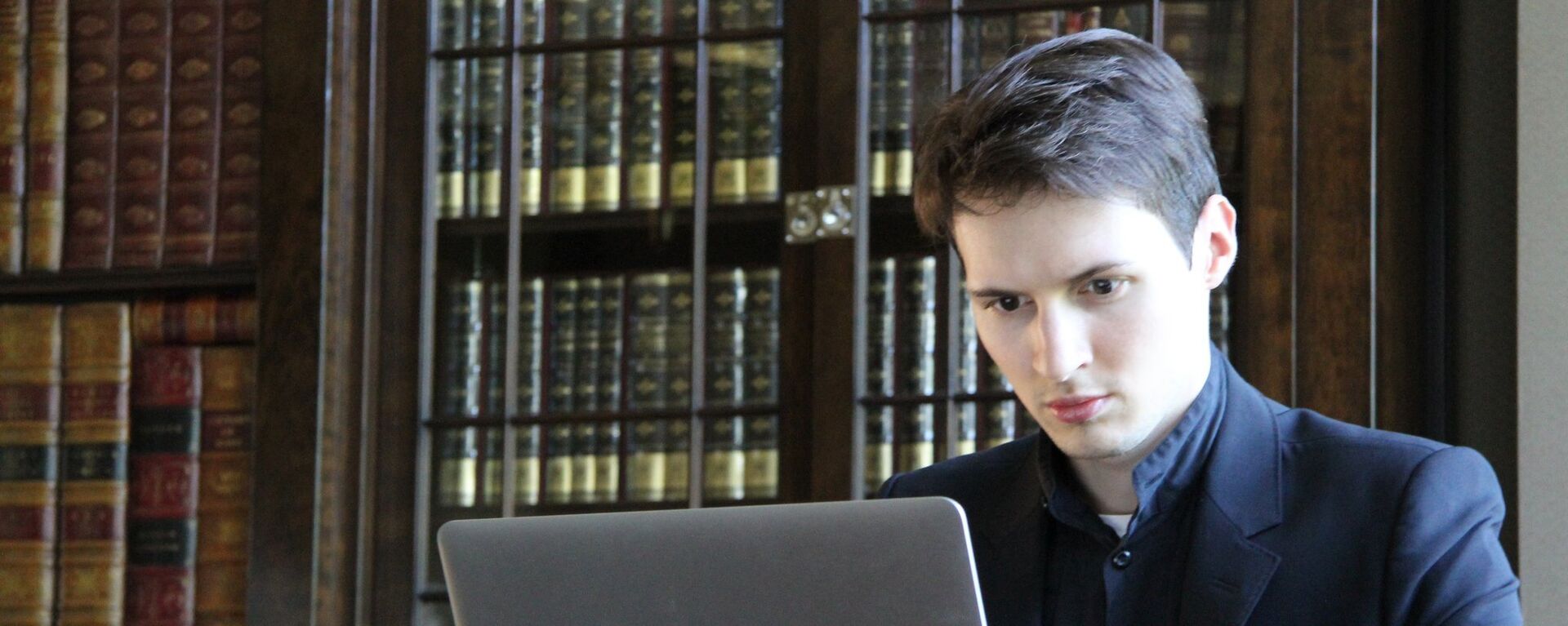https://sputnikglobe.com/20240829/durovs-arrest-gives-us-big-tech-big-opportunity-to-tighten-its-grip-on-europe-heres-why-1119951744.html
Durov's Arrest Gives US Big Tech Big Opportunity to Tighten Its Grip on Europe: Here's Why
Durov's Arrest Gives US Big Tech Big Opportunity to Tighten Its Grip on Europe: Here's Why
Sputnik International
Telegram founder Pavel Durov’s arrest in France has sparked fierce debates about the meaning of free speech on big tech platforms and the power of the state to clamp down on them.
2024-08-29T18:02+0000
2024-08-29T18:02+0000
2024-08-29T18:02+0000
analysis
pavel durov
europe
lars hilse
france
silicon valley
european union (eu)
https://cdn1.img.sputnikglobe.com/img/07e8/08/1d/1119951928_0:182:2993:1865_1920x0_80_0_0_156584bb8541cfddfa780cb3b364f31a.jpg
Pavel Durov’s arrest will “have an immediate impact” on the EU’s already struggling tech ecosystem, and “potentially damage Europe’s reputation for tech innovation and free speech,” veteran independent cybersecurity expert and digital strategy advisor Lars Hilse has told Sputnik.The EU already faces a series of hurdles vis-à-vis the US in tech, with a diversity of languages and cultures, stricter privacy, anti-trust and speech laws, lagging infrastructure development and lack of state investment in emerging technologies serving to “hinder innovation and the rapid scaling of tech companies,” the expert, who has advised governments, militaries and intelligence services on digital strategy, said.The US, by contrast, has used the monopolization of its tech sector to get “a head start in building infrastructure, expertise, and obviously market share…benefit[ing] from a large domestic and homogenized market, allowing them to scale quickly before expanding globally,” Hilse explained.“We have acquisition strategies where US tech giants often acquire promising European stock before they can actually scale. Then you have cloud service dominance in the US,” he added.The immediate impact of Durov’s arrest will be the loss of investor confidence, Hilse fears.“The talent attraction and retention, loss of innovation, or talent moving to the US might be increased… Potential founders and investors might be discouraged from starting companies in Europe, fearing similar treatment” as Durov got in France, the observer stressed.Ultimately, Hilse remains optimistic, suggesting the Durov case “could spur efforts to create more decentralized, censorship-resistant platforms.”
https://sputnikglobe.com/20240828/jim-rogers-durovs-arrest-could-end-frances-attractiveness-for-high-tech-1119940407.html
https://sputnikglobe.com/20240828/durov-under-judicial-supervision-forbidden-to-leave-france---paris-prosecutors-office-1119943037.html
https://sputnikglobe.com/20240827/telegrams-durov-vs-metas-zuckerberg-how-do-they-stack-up-on-censorship-1119928274.html
france
silicon valley
Sputnik International
feedback@sputniknews.com
+74956456601
MIA „Rossiya Segodnya“
2024
News
en_EN
Sputnik International
feedback@sputniknews.com
+74956456601
MIA „Rossiya Segodnya“
Sputnik International
feedback@sputniknews.com
+74956456601
MIA „Rossiya Segodnya“
does europe have big tech, why doesn't europe have big tech, why does us dominate in big tech
does europe have big tech, why doesn't europe have big tech, why does us dominate in big tech
Durov's Arrest Gives US Big Tech Big Opportunity to Tighten Its Grip on Europe: Here's Why
Telegram founder Pavel Durov’s arrest in France has sparked fierce debates about the meaning of free speech on big tech platforms and the power of the state to clamp down on them. It’s also caused concerns that Europe – which has no tech giants of its own, could become even more dependent on the US in this area.
Pavel Durov’s arrest will “have an immediate impact” on the EU’s already struggling tech ecosystem, and “potentially damage Europe’s reputation for tech innovation and free speech,” veteran independent cybersecurity expert and digital strategy advisor Lars Hilse has told Sputnik.
The EU already faces a series of hurdles vis-à-vis the US in tech, with a diversity of languages and cultures, stricter privacy, anti-trust and speech laws, lagging infrastructure development and lack of state investment in emerging technologies serving to “hinder innovation and the rapid scaling of tech companies,” the expert, who has advised governments, militaries and intelligence services on digital strategy, said.

28 August 2024, 18:45 GMT
The US, by contrast, has used the monopolization of its tech sector to get “a head start in building infrastructure, expertise, and obviously market share…benefit[ing] from a large domestic and homogenized market, allowing them to scale quickly before expanding globally,” Hilse explained.
“The United States has a very, very, very well established venture capital ecosystem, particularly in Silicon Valley, where they’re providing startups with very easy access to funding and a huge pool of expertise,” Hilse said. “You have a lot of talented European tech professionals moving to the United States for better opportunities, higher salaries, contributing to a brain drain effect.”
“We have acquisition strategies where US tech giants often acquire promising European stock before they can actually scale. Then you have cloud service dominance in the US,” he added.
The immediate impact of Durov’s arrest will be the loss of investor confidence, Hilse fears.

28 August 2024, 20:08 GMT
“This could certainly cause investors to become more cautious or hesitant about investing in European tech companies,” he said. In turn, US big tech could snap up even more market share in Europe, hitting fledgling local companies while they’re already down and struggling thanks in part to their own governments’ policies.
“The talent attraction and retention, loss of innovation, or talent moving to the US might be increased… Potential founders and investors might be discouraged from starting companies in Europe, fearing similar treatment” as Durov got in France, the observer stressed.
Ultimately, Hilse remains optimistic, suggesting the Durov case “could spur efforts to create more decentralized, censorship-resistant platforms.”
“Telegram was very good at that,” Hilse said. “Maybe one of the consequences [will be] that out of the ground something is going to pop up that is in and of itself very censorship-resistant due to technological innovation. However, that in turn would require huge investments to take off, or perhaps a combination of investment and the right zeitgeist,” the observer concluded.

27 August 2024, 17:02 GMT





